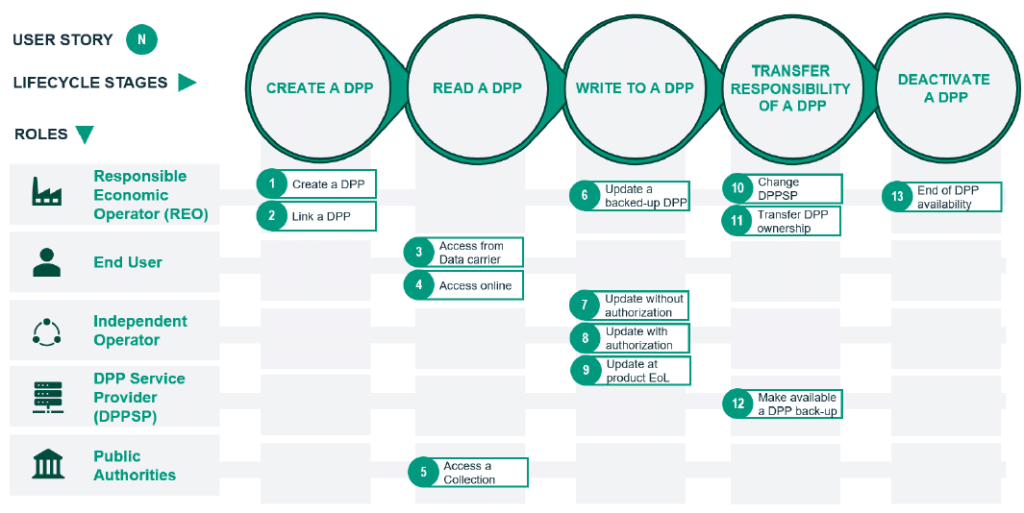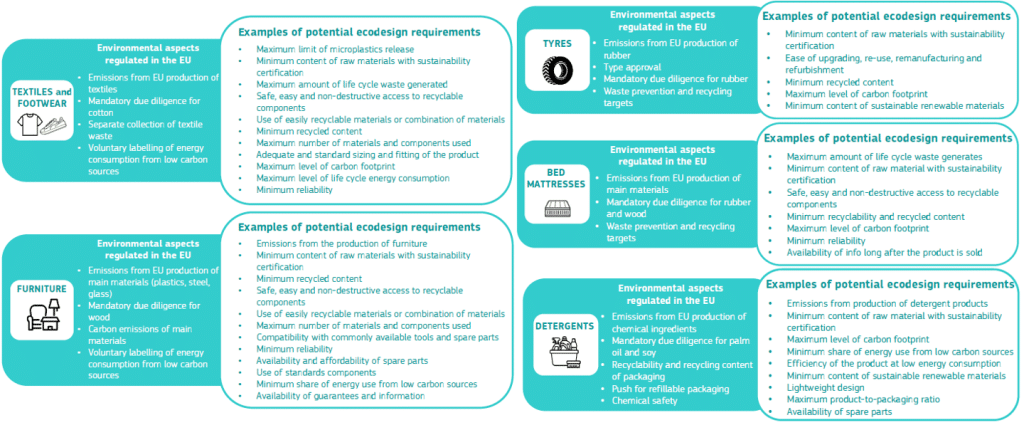Plattform Industrie 4.0 regularly provides updates on the Digital Product Passport (DPP) through the “DPP Check-In”. These Check-Ins summarize concrete updates on various aspects of the DPP and create a space for discussion, exchange, and questions. The 7th Check-In took place on November 19, 2024. This article offers a summary and general overview. To receive all updates and invitations to the DPP Check-Ins, please register here.
CURRENT STATUS: DPP & ESPR
A brief overview of the DPP can be found in the DPP Fact Sheet (as of 07/24), in more detail in the document “Digitaler Produktpass – Status Quo” (as of 12/23), or in the first DPP Check-In. You can also find the Plattform Industrie 4.0 DPP overview page here. Below is a brief summary of the current status – for further information, please refer to the mentioned documents.
The Ecodesign Regulation came into force on July 18, 2024. A work plan for 2025–2028 is expected to be published in March/April 2025. From 2026 onwards, product-specific regulations will be issued through Delegated Acts. Once adopted, a transition period of 18 months is expected (unless otherwise specified).
Currently prioritized products include:
Iron and steel, aluminium, textiles (especially clothing and footwear), furniture (including mattresses), tyres, detergents, paints, lubricants, chemicals, energy-related products, ICT products, and other electronic devices.
Textiles and iron & steel will be the first product groups addressed in Delegated Acts. The DPP is expected to come into force in 2027. Batteries (from 2027) and construction products (from 2028) will be governed by their own regulations. The European Commission plans to regularly update the list of priority products.
The Ecodesign Regulation defines the following criteria, to be specified per product group in the Delegated Acts:
- Durability
- Reliability
- Reusability
- Upgradability
- Reparability
- Maintainability
- Presence of hazardous substances
- Energy consumption and efficiency
- Water use and efficiency
- Resource use and efficiency
- Recycled content
- Remanufacturability
- Recyclability
- Material recoverability
- Environmental impacts (incl. carbon and environmental footprint)
- Amount of expected waste
You can view the current DPP timeline here.
CIRPASS-2
In May 2024, the European flagship project on the Digital Product Passport “CIRPASS-2” was launched – more information is available in the report from the 6th Check-In. Recently, the new document “User Stories 3.0” was published.
This document outlines user stories for the DPP system, aiming to bridge the gap between intentions expressed in ESPR and the ongoing development and standardization activities. It explains, justifies, and illustrates the DPP system’s functions and helps specify technical requirements and reference architecture. It also gives an overview of stakeholder roles in the DPP.
Further Updates
Ecodesign Forum
Registration for the official stakeholder forum, the “Ecodesign Forum”, opened on November 7, 2024. Click here for all application details.
DPP Q&A Document
A comprehensive Q&A document on the DPP was published by the European Commission in late September, featuring 171 questions and answers. Selected topics were discussed in the Check-In.
Call for Evidence – DPP Service Providers
On November 12, 2024, the Commission launched a Call for Evidence. The goal is to define rules for DPP service providers (DPP-as-a-Service). Feedback is possible until December 10, 2024; a public consultation will follow.
JRC Study on New Product Priorities
In November, the JRC study “Study on new product priorities” was published. It analyzes various product groups in detail and recommends priorities (non-binding):
- 11 end products (e.g. textiles/shoes, furniture, tyres, mattresses, detergents, paints, lubricants, cosmetics, toys, fishing gear, hygiene products)
- 7 intermediates (e.g. iron/steel, base chemicals, non-ferrous metals, aluminium, plastics/polymers, pulp/paper, glass)
- 3 horizontal criteria (durability, recyclability, recycled content)
Note: these products were defined before the final ESPR, which is why electronics are not listed. More details will come with the first work plan (expected March/April 2025). The study also suggests Ecodesign criteria that could serve as a foundation for companies.
Preparatory Studies
Stakeholders can already participate in the Preparatory Study for Iron & Steel and the Preparatory Study for Textiles by the European Commission.
Trade Secret Protection in the Use of DPPs
At the 7th Check-In, Thomas Preindl (OwnYourData / TU Wien Informatics) discussed trade secret protection in the context of the project DPP-CRC: Digital Product Passport for Carbon Reduced Concrete. You can download the presentation here.
The project explored how Zero-Knowledge Proofs (ZKPs) can help preserve trade secrets in Environmental Product Declarations (EPDs) and digital product passports for concrete.
Advantages:
- Protection of trade secrets
- Supply chain confidentiality (accreditation)
- Fast, independent verification
- Compliance by design
Challenges:
- Lack of standardization for ZKPs in DPP context
- Computing resources (10 sec/proof, dropping fast)
- Low awareness of the technology
How to Master the DPP – First Implementation Steps
Stefan Novoszel (Tietoevry) presented early implementation steps for the DPP. These are based on potential product information that may become mandatory. The Ecodesign criteria in ESPR are grouped into three categories: Characteristics (Specification, Compliance, Identifiers), Impact, and Circular Ability. The resulting “DPP Data Map” serves the following purposes:
- Identify product-specific data needs (categories and attributes)
- Assess data nature, input, maturity, and priority to enable gap analysis
- Help calculate the criticality of individual attributes to set priorities
- Evaluate the product’s DPP data readiness
The presentation can be downloaded here.
USEFUL INFORMATION:
- DPP Fact Sheet: https://plattformindustrie40.at/wp-content/uploads/2024/05/Digitaler-Produktpass-Fact-Sheet-2.pdf
- DPP Check-In Overview Page: https://plattformindustrie40.at/digitaler-produktpass/
- DPP4all Study: https://www.bmk.gv.at/en/topics/innovation/publications/A-Digital-Product-Passport.html
- CIRPASS (Coordinated Support Action): https://cirpassproject.eu/
- CIRPASS-2 (EU Flagship Project on DPP): https://cirpass2.eu/
- Ecodesign Regulation: https://eur-lex.europa.eu/legal-content/DE/TXT/PDF/?uri=OJ:L_202401781
- Standardization Request: https://ec.europa.eu/transparency/documents-register/detail?ref=C(2024)5423&lang=de
The next Check-In is expected to take place in January 2025. The Check-Ins are public and free of charge. You can join the mailing list here.
Feel free to send comments, additions, or feedback to verena.halmschlager@plattformindustrie40.at – we appreciate your input!
The check-ins are funded by the 2CFIMH project.



